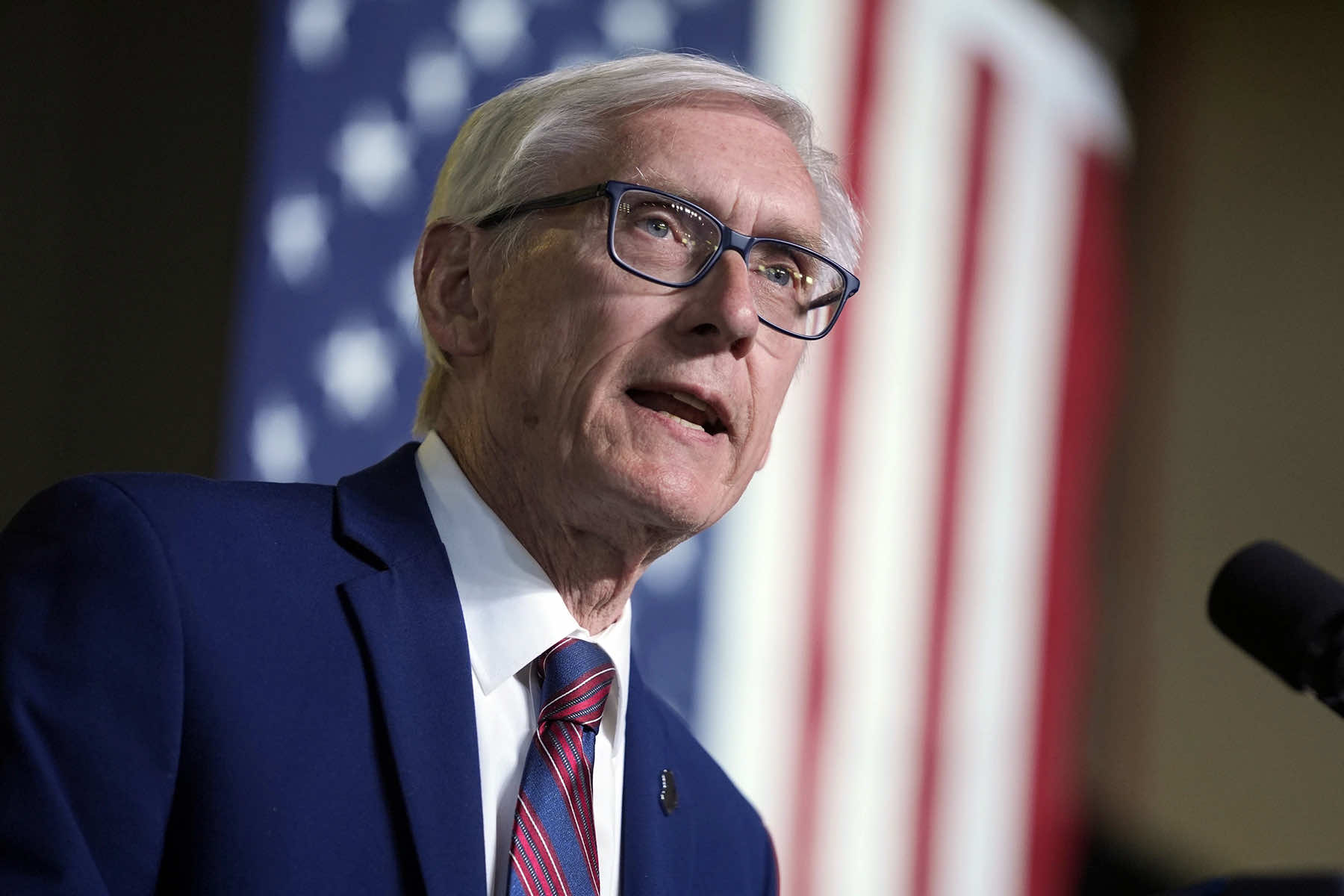
In an extraordinary address to Wisconsin residents on May 2, Governor Tony Evers condemned the escalating threats from the Trump administration and Republican lawmakers after a top immigration adviser suggested the Democratic governor could be arrested for issuing legally vetted workplace guidance to state employees.
The pressure campaign began with social media smears and escalated into official threats, but for Governor Evers, the stakes have never been about politics. They have been about principle.
The guidance at the center of the controversy was reviewed by state attorneys, consistent with national standards, and written to ensure that Wisconsin employees remained compliant with the law, not defiant of it.
Yet as right-wing lawmakers and Trump operatives pushed the narrative toward criminalization, Governor Evers made clear he would not be intimidated.
“As disgusted as I am about the continued actions of the Trump administration, I’m not afraid,” said Governor Evers. “I’ve never once been discouraged from doing the right thing, and I will not start today.”
Legal scholars have warned that normalizing these kinds of political threats, especially when made against officials following established procedures, signals a collapse in the boundaries between governance and retaliation.
What was once the domain of policy disagreement is now treated as criminal defiance, a shift that places every public servant, and by extension every citizen, under potential suspicion.
“These threats represent a concerning trajectory in this country,” said Governor Evers. “We now have a federal government that will threaten or arrest an elected official or even everyday American citizens who have broken no laws, committed no crimes, and done nothing wrong.”
The remarks came after threats by Tom Homan, Trump’s senior border adviser, who ominously told reporters, “Wait till you see what’s coming,” when asked about the Evers administration’s internal policy instructing state workers how to respond if approached by ICE agents.
The guidance, a standard legal protocol also used by other states like Connecticut, advised employees not to answer questions or release records without legal counsel present.
Republican operatives seized on the memo, distorting it as a directive to obstruct federal law enforcement. The twisted narrative was amplified online by prominent MAGA influencers and even figures like South African Oligarch Elon Musk, who echoed false claims that Governor Evers had instructed state workers to defy ICE.
“Republicans and their right-wing allies, including Elon Musk, lied about this guidance, spread misinformation, accused me of doing things I didn’t do or say, and fueled a fake controversy of their own creation,” said Governor Evers.
The manufactured outrage quickly metastasized into something far more dangerous, calls for criminal charges against Wisconsin’s Governor. On social media, some Republican lawmakers openly fantasized about Governor Evers being handcuffed and removed from the state Capitol.
Republican Wisconsin state Representative Calvin Callahan posted a fake image on social media showing Trump in a police uniform behind a grim-faced Governor Evers in handcuffs outside of the state Capitol.
“I haven’t broken the law. I haven’t committed a crime and I’ve never encouraged or directed anyone to break any laws or commit any crimes,” said Governor Evers.
The stakes are not merely political. The threats against Governor Evers come just days after Milwaukee County Circuit Judge Hannah Dugan was arrested on April 25 by federal agents at her courthouse under highly questionable circumstances.
The timing and tenor of both incidents have alarmed legal experts and civil rights advocates, who see a pattern of partisan prosecution dressed up as law enforcement.
In her case, Judge Dugan was charged with two felonies after allegedly allowing an undocumented defendant and his lawyer to leave her courtroom via a jury door, a route still inside the legal bounds of courthouse procedure and used frequently for privacy or security reasons.
There was no evidence of criminal intent, and no law was violated. Nevertheless, FBI agents moved in to arrest her in full public view and staged for a national audience, igniting outrage throughout Wisconsin’s judicial community.
Critics argue that these back-to-back threats, first against a sitting judge and now a sitting governor, signal a chilling abuse of federal power by Trump and his regime, aimed squarely at political opponents.
“We live in the United States of America, folks. We are a country of laws. The rule of law matters,” said Governor Evers. “Following the law matters in this country. The federal government doesn’t get to abuse its power to threaten everyday Americans.”
Governor Evers emphasized that his guidance to state workers merely instructed them to seek legal counsel before cooperating with immigration enforcement, hardly a radical notion. The policy aligns with longstanding best practices issued by the National Immigration Law Center and mirrors what state attorneys have recommended for years.
“This guidance was simple: to provide clear, consistent instructions to state employees and ensure they have a lawyer to help them comply with all federal and state laws. Nothing more, nothing less,” said Governor Evers.
The Trump regime’s violent escalation to threats and intimidation reflects a broader trend of anti-democratic behavior from federal agencies now operating with impunity, according to legal observers. While ICE and the FBI once maintained a cautious distance from overt political agendas, recent actions suggest that distinction has all but eroded.
The renewed assault on immigration law, even in places where no lawbreaking occurred, is viewed by critics as a pretext for harassing elected officials who resist Trump’s federal agenda. Unlike sanctuary city clashes from previous administrations, this moment marks a dystopian shift.
A sitting state governor is being directly threatened with arrest for administrative memos vetted by legal counsel.
“I swore an oath when I took this office to support the Constitution of the United States and the Constitution of the state of Wisconsin, and to faithfully discharge the duties of this office to the best of my ability,” said Governor Evers. “I will never waver from that promise.”
The response from the Wisconsin GOP has been largely celebratory. Several state lawmakers issued press releases defending the hypothetical arrest, framing it as a justified consequence for “interfering” with ICE. But legal experts say such language is dangerously loose and betrays a complete disregard for due process and constitutional law.
The Evers administration’s legal guidance did not bar ICE officers from entering public buildings or prevent cooperation with lawful federal warrants. Instead, it instructed state workers to contact a state agency attorney before releasing records or submitting to questioning, precisely the sort of legal safeguard that should alarm no one in a constitutional democracy.
And yet, to hear Tom Homan’s framing, that protection is now tantamount to obstruction.
“You cannot support what we’re doing, and you can support sanctuary cities if that’s what you want to do, but if you cross that line… that’s a felony and we’re treating it as such,” said Homan.
Legal scholars noted that not only did the memo by Governor Evers not cross such a line, it never came close. Still, the MAGA message was clear: challenge Trump-era enforcement culture, and you’ll face public threats, federal scrutiny, or worse.
Nowhere is that clearer than in the case of Judge Hannah Dugan. Observers say Judge Dugan, who has a record of ruling based on humanitarian grounds and defending legal norms, became a political target.
While the federal complaint alleged “harboring,” it offered no evidence of premeditated evasion or intent. No judicial warrant was presented in the courtroom at the time. ICE agents presented only an administrative warrant, little more than a memo with no legal empowerment.
What followed was a made-for-TV arrest with Judge Dugan placed in handcuffs, and later leg shackles when she appeared in Federal court. Conservative media framed it as justice served. But for many in Wisconsin’s legal community, it was a line crossed into autocracy, and a menacing warning.
Civil liberties groups note that the risk is normalization. What begins as partisan messaging can quickly harden into prosecutorial policy, especially under a corrupt regime that rewards loyalty and punishes dissent.
“In this country, the federal government doesn’t get to arrest American citizens who have not committed a crime,” said Governor Evers. “In this country, we don’t threaten to persecute people just because they belong to a different political party.”
That this needs to be said at all, legal experts argue, is evidence of a dangerous shift. A federal government acting as political enforcer, backed by a loyalist base and cheered on by state-level lawmakers, is not simply alarming. It is disqualifying of the very institutions it claims to protect.
Governor Evers closed his public address with a call for unity and fidelity to the Constitution. But it came with the recognition that the foundations of democratic governance are under siege from within.
“I hope and pray every elected and appointed official in this country, including the President of the United States of America, will do the same,” Governor Evers added.
The use of the U.S. Immigration and Customs Enforcement (ICE) and the Federal Bureau of Investigation (FBI) by Trump and his minions to target political enemies is a crime. It is an illegal abuse of power and criminal overreach that strikes at the heart of democratic accountability.
And for the second time in the span of a week, Wisconsin stands as the frontline in that fight.
© Photo
Evan Vucci (AP)














